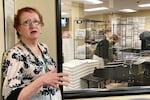Clatsop County Clerk Tracie Krevanko loves a lot about her job.
She enjoys performing civil wedding ceremonies, legally binding two people to one another from the comfort of her county office. She loves the variety of it; she licenses cats and dogs and oversees the recordings of land deeds.
But her favorite part of the gig is overseeing elections.

Election workers process ballots that are unreadable by machines due to misprinted barcodes on Saturday, May 22.
April Ehrlich / OPB
“I love working in elections … I could retire, but I don’t want to, and I hope to continue to feel that way,” she said, adding that she relishes keeping up on the constantly changing election laws, working with the Legislature and generally just performing her “civic duty” to uphold, well, democracy.
“We are protecting the right for people to vote,” Krevanko said. " Our goal is that any eligible person can vote and their vote is counted and it’s accurate.”
In the last two years, thanks largely to former President Donald Trump’s false claims that the 2020 election was stolen, public scrutiny shifted to secretaries of state — the people who oversee elections on a statewide level. Previously, these statewide roles have largely been ignored, often viewed as a stepping stone to higher office. But now, across the country, it’s become much more competitive with political parties noting it will be secretaries of state who oversee the 2024 presidential contest. (Recall President Trump’s call urging Brad Reffensperger, Georgia’s secretary of state, to “find” the 11,780 votes he needed to win there.)
But drill down a layer.
The real administrative work of democracy is usually done at the county level, often by a clerk or an elections director. These public servants are often only noticed when there is a controversy, such as the ongoing debacle in Clackamas County with the blurred ballot barcodes. Yet as Ben Morris, with the Oregon Secretary of State’s office, recently pointed out, the secretary of state serves as the “guardrail,” but it’s the “county clerks who are driving the cars.” They are the ones who oversee the elections and all the planning that goes into it. They register voters, maintain voter lists, oversee the printing of ballots and voter pamphlets and are in charge of collecting ballots and counting them.

Clackamas County Elections Clerk Sherry Hall, shown in this May 19, 2022 file photo, has been highly criticized in recent weeks after delays in counting results that stemmed from misprinted ballots discovered in early May. Blurry barcodes on the ballots have meant that many had to be hand-counted rather than read by vote-counting machines.
Gillian Flaccus / AP
There is no uniformity from county to county when it comes to the clerks and how these duties are handled. Some Oregon counties have election directors. Others have county clerks. And the overall governing structure is unique to each county: Some clerks are appointed and report to a county manager. Others are elected, such as Clackamas County’s Sherry Hall, and are beholden to voters.
Hall’s latest election blunder, in which she failed to act urgently when she discovered blurred barcodes on the county’s ballots, highlights the difficulty with holding elected clerks accountable. The election results from the May 17 primary have been delayed for weeks.
Why can’t the state just do it?
Secretary of State Shemia Fagan, whose office oversees Oregon elections, fielded a lot of questions after Hall failed to deliver election results on the night of the May 17 primary. One of them: Why didn’t Fagan just take over?
“The statute is very, very clear,” Fagan said. “And so, there are folks out there, I think just out of frustration saying, ‘Fagan should take over.’ It’s just simply the law doesn’t provide for that.”

Oregon Secretary of State Shemia Fagan poses for a photo.
Courtesy of Oregon Secretary of State's office
Krevanko, with Clatsop County, is an example of an appointed clerk. She answers to a county manager who responds to county commissioners. Before Clatsop, Krevanko worked in elections in Washington County in Oregon as an elections supervisor. Her background is in election work.
To move from an elected clerk to an appointed clerk, a county would have to become what’s known as a “home-rule charter” county. The state constitution calls for an elected sheriff, an elected treasurer and an elected clerk; the way around that constitutional provision is to create a county charter, a means for county leaders to establish their own rules. It’s often a lengthy process and can be initiated by either voters or a board of county commissioners. To transition to a charter county, a committee formed of four members chosen by the board of commissioners, four people chosen by the county’s legislative delegation and a ninth member selected by both groups would meet to draft the new charter, which voters would have to approve.
Hall’s latest mistake has people speculating whether it’s time to consider changing Clackamas County’s form of government and switching to an appointed clerk, as Fagan seemed to imply recently on OPB’s Think Out Loud.
“Their boss is the county commission, who appoints them,” Fagan said. “And if something like this would have happened in Multnomah County or in Washington County, then the county would have had direct authority to oversee that person. In Clackamas County, that wasn’t the case.”
Out of Oregon’s 36 counties, a handful employ appointed clerks, often referred to as elections directors. Lane and Washington counties were the first to adopt a “home rule” charter in 1962, followed by Hood River in 1964, Multnomah in 1967, Benton in 1972, Jackson in 1978, Josephine in 1980, Clatsop in 1988 and Umatilla in 1993, according to the Oregon Blue Book.
Christopher McKnight Nichols, an associate professor of history at Oregon State University, said he believes there are larger conversations happening on whether to move away from elected positions toward appointed for some basic government functions. There has certainly been heated debate nationwide recently over constitutional sheriffs, some of whom have become a political force and refused to carry out state law or COVID-19 related mandates.
But not everybody believes that’s the answer.
Dede Murphy, the clerk in Coos County, noted having the “support of the voters” is also important. The clerks in Coos County are elected. And, as others have noted, the May primary election process went smoothly throughout the rest of the state.
For elected county clerks, their name often appears at the end or the backside of the ballot, Nichols noted.
But despite how the ballot looks, “it’s a crucially important invisible role and only when this visible debacle comes up do some of us reflect on how important it is to have a good, competent county clerk,” he said.
Hall’s reelection bids have been largely easy since she first won her job in 2003.
Hall is up against Catherine McMullen, a program specialist for Multnomah County Elections, in November.
New attention, because of Trump
Although the clerks at the county level often fall under the radar, there has been an uptick after the 2020 election of Joe Biden of questions and interactions implying they aren’t trustworthy.
James Morales has been the director for the records and elections department in Benton County since July 1998.
“I’ve had inquiries about whether I’m elected or how I got into this position,” he said. “I’ve fielded questions I haven’t heard a whole lot of over the last 24 years. Those are the type of inquiries we’re fielding, both me and my staff. We just keep doing our job and be as transparent as we can be while still securing our process.”
Krevanko, of Clatsop County, had to call her son recently to figure out how to deactivate her Facebook account.
“I had a couple of Facebook messages that were not very nice and letters that were mailed, one in particular, using letters cut and pasted out of a magazine that was threatening and scary,” she said. “I’ve never had that before, threatening me personally.”
The messages all had to do with an election, questioning Krevanko’s integrity on the job.
“In all my years I’ve worked in elections, I’ve experienced angry people but not like this … There just wasn’t the hostility that there is now,” Krevanko said, who has worked in elections for about three decades.
Clackamas County Chair Tootie Smith said she was “aghast” when she heard of the misprinting of ballots mailed to voters. There is a possibility, Smith said, the board could discuss what switching to a home-rule charter would entail after the election is certified. But that process would be impossible to accomplish, she noted, before the November election. And she’s not sure voters want a change.

A printing error on Clackamas County primary election ballots has led to turmoil that will likely take weeks to solve. At a press conference held in Clackamas on May 18, 2022, Clackamas County Chair Tootie Smith says “They have known about the blurred bar codes for weeks. They must take the steps necessary to correct this problem they knew about weeks ago.”
Kristyna Wentz-Graff / OPB
“In Clackamas County we’re pretty independent out here,” she said. People like to have a say in how their government is run, Smith added, noting that it’s a big switch for people to “change the entire governance model because one person failed a particular duty.”
Smith, a Republican, lamented that the election failure could erode trust in the vote-by-mail system in Oregon — a process, she noted, that works.
Ultimately, she said, it will be up to the voters to decide whether Hall keeps her post.
Clackamas County final election results are expected to be posted and certified on Monday. The outcome of the Democratic primary for House District 38 has still not been revealed.